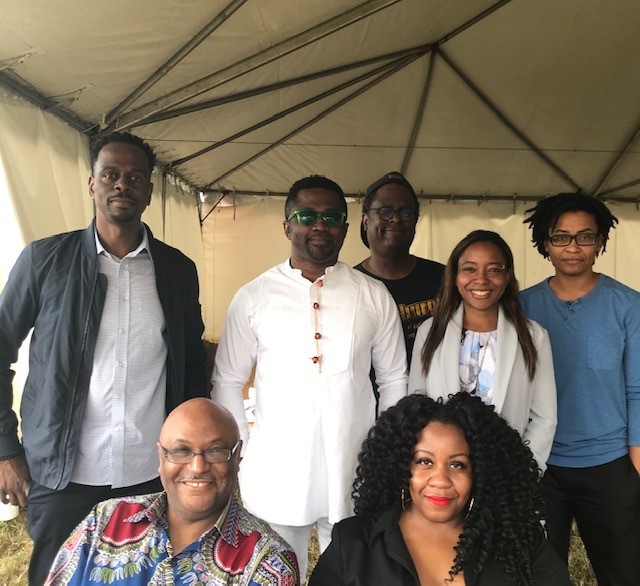2020-2021 Afrofuturism Syllabus - Week 6 - Dr. Michele Berger on The Afrofuturist Aesthetic
Image: Participants in the Afrofuturism Writers' Pavilion at the 2020 Zora Neale Hurston Festival of the Arts and Humanities. Dr. Berger is in the back row, second from the right. Front row, left to right: Maurice Broaddus, Dr. Chesya Burke. Back row, left to right: P. Djèlí Clark, Dr. Iheoma Nwachukwu, Bill Campbell, Dr. Michele Tracey Berger, Tenea D. Johnson. Image Credit: Dr. Michele Tracey Berger.
Welcome to Week 6 of the ZORA! Festival 2020-2021 Afrofuturism Course!
Please begin by reviewing About the Course for an introduction and orientation to the 2020-2021 Afrofuturism Syllabus, which bridges the organizing themes of the first two years of the five-year Afrofuturism Conference Cycle: "What is Afrofuturism?" and "What is the Sound of Afrofuturism?"
Note: Each week the course coordinator will release new content related to the conference themes. Content posted here will remain publicly accessible and may be incorporated into other courses, in part or in full, via links to this site. Suggested citation: French, Scot. Syllabus for ZORA! Festival Afrofuturism Course, University of Central Florida, Orlando, Fall 2020-Spring 2021. STARS, https://stars.library.ucf.edu/afrofuturism_syllabus_about/.
Conversations
In the Conversations segment we share resources featuring participants in the 2020-2021 ZORA! Festival Afrofuturism Conference.
This week’s featured Conversation is a podcast interview with Dr. Michele Tracy Berger, a scholar of Women's and Gender Studies and author of several Afrofuturism-themed novellas in the genre of horror/"dark fiction."
Michele Tracy Berger, Ph.D., is an associate professor in the Department of Women's and Gender Studies at the University of North Carolina-Chapel Hill and former Director of the Faculty Fellows Program at UNC-Chapel Hill's Institute for the Arts and Humanities. She teaches and conducts research in a wide variety of areas, including racial and gender health disparities. Dr. Berger joined other writers in the Afrofuturism Pavilion at the 2020 ZORA! Festival. She recently published an essay, "My Unlikely Path to Afrofuturism," in The South Writ Large: Stories, Arts, and Ideas from the Global South (Winter 2020).
This interview was conducted by Tiffany Pennamon, a Ph.D. candidate in English at the University of Florida, during the ZORA! Festival Afrofuturism Conference on Jan. 30, 2020. It lasts about 35 minutes.
You can find the interview here.

Explorations
In the Explorations segment we pose a series of questions for further investigation and class discussion, based on the featured Conversation. As you listen to the podcast interview with Dr. Berger, consider the following questions:
- Dr. Berger defines Afrofuturism as "a type of aesthetic" that questions canonical -- and frequently distorted/harmful -- depictions of African-descended people in literature, art, politics, etc. In practice, this involves rethinking and reimagining the world through the lived experiences and creative expressions of black people living today as well as those who came before, such as Zora Neale Hurston. What is the relation between past, present, and future in this Afrofuturist view?
- How, in Dr. Berger’s own field of horror writing, have black women writers embraced an Afrofuturist aesthetic and reimagined this literary genre?
- Dr. Berger mentions several well-known authors -- Alice Walker, Toni Morrison, Toni Cade Bambara, among others -- as early influences. Who are some of the more recent, and perhaps lesser-known, women writers that Dr. Berger references in her interview? Where can you find their work?
- What role does Dr. Berger see for Afrofuturist writers in shaping our future?
- Octavia Butler - Mind of My Mind (1977); Kindred (1979); Parable of the Sower (1993)
- Samuel R. Delany
- Zora Neale Hurston
- Alice Walker
- Toni Morrison
- Nisi Shawl
- Sycorax's Daughters (2017)
- Ntozake Shange
- Pearl Cleage
- Eden Royce
- Nicole Kurtz Smith
- Linda Addison
- Toshi Reagon's adaptation of Parable of the Sower (1993)
- Dr. Michele Tracy Berger - Nussia (2018); Reenu-You (2020)
References
Authors, artists, and works referenced in the podcast include:


Next week: An interview with Maurice Broadus, a writer, community organizer, and teacher who uses Afrofuturism in his writing and life. His books include The Knights of Breton Court trilogy, the steampunk novel Pimp My Airship, and the YA detective novel The Usual Suspects.

